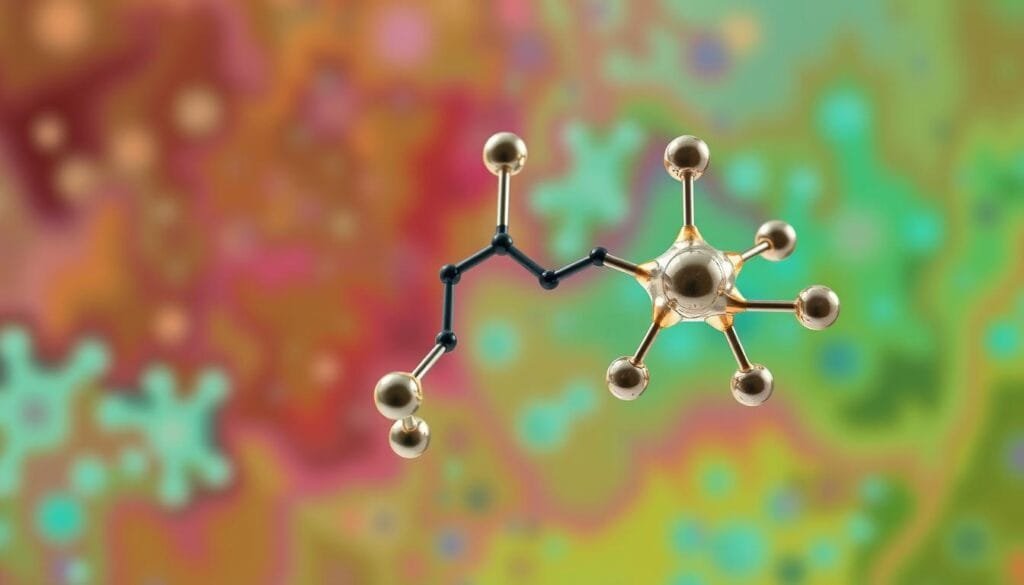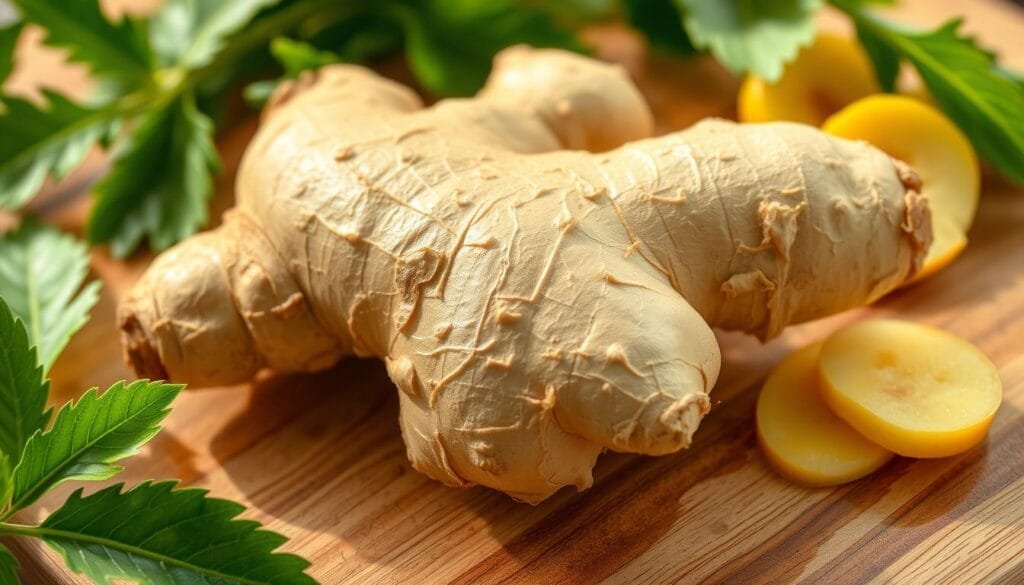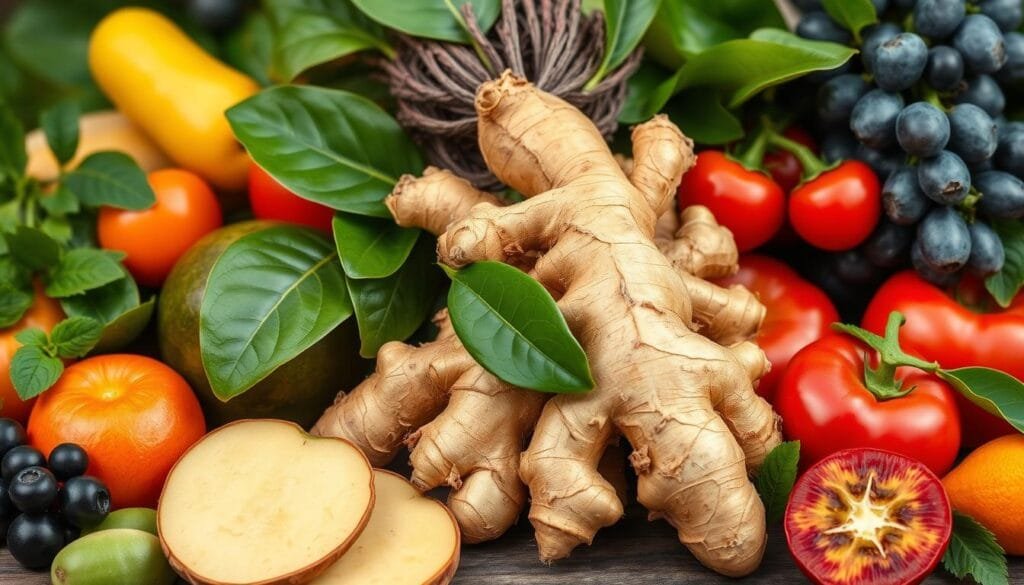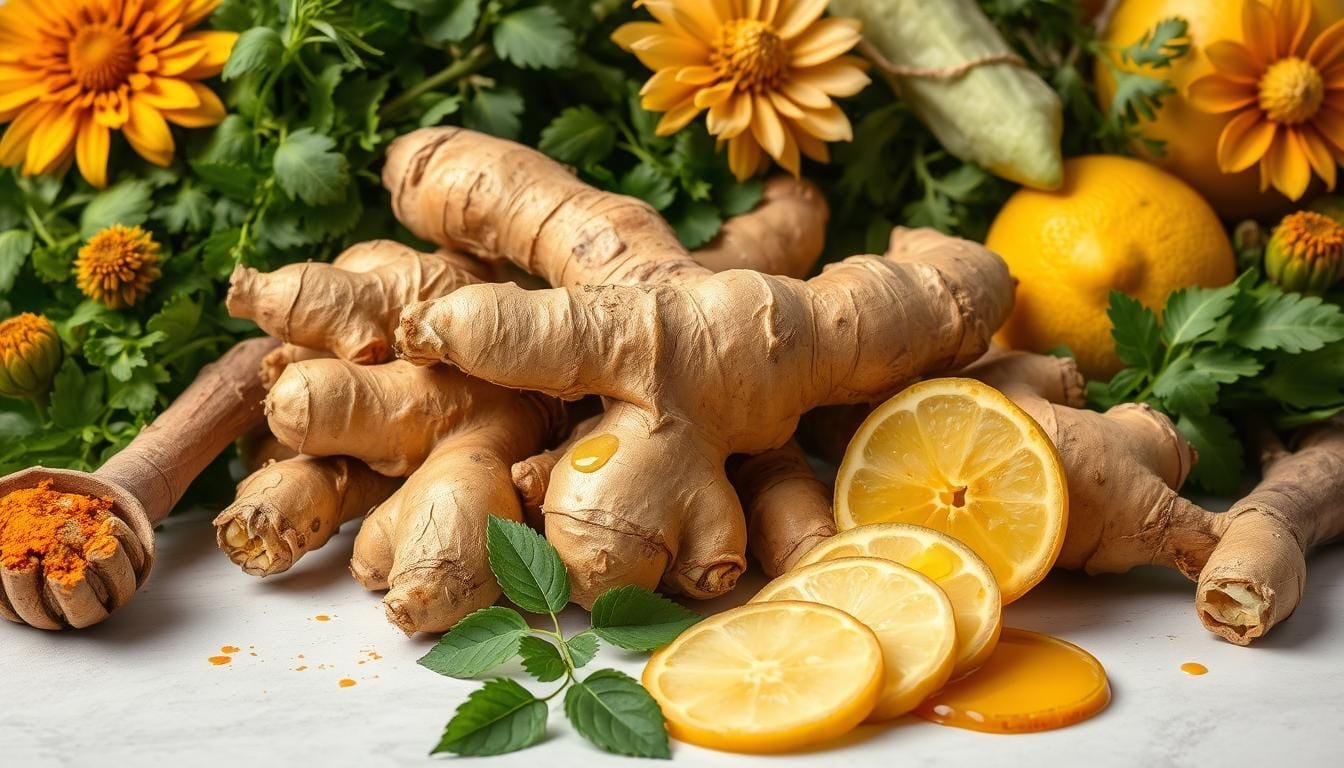I’m excited to share the amazing benefits of ginger with you. This medicinal plant has been used for over 3,000 years. It’s a key ingredient in traditional medicine and cooking.
Ginger belongs to the Zingiberaceae family, which also includes turmeric and cardamom. Its rhizome, or ginger root, is the most important part.
Ginger contains a powerful compound called gingerol. This is what makes ginger so effective. It fights inflammation and has antioxidant properties.
Ginger can help with digestion and reduce nausea. It’s also great for fighting the flu and common cold. Ginger is a true natural wellness hero.
You can use ginger in many ways, like fresh, dried, or as an oil or juice. It’s easy to add to your daily routine. Let’s dive into the science behind ginger and how it can help you stay healthy.
Understanding Ginger: Origins and Traditional Uses
Ginger is a rhizome known for its unique aroma and flavor. It has been loved by many for centuries. Originating in Asia, ginger has been a key part of traditional medicine worldwide.
The fragrance and taste of ginger come from its natural oils. The compound gingerol is key to its health benefits.
What Makes Ginger a Powerful Medicinal Plant
Ginger has been used for centuries to help with digestion and reduce nausea. It also fights the common cold and flu. Its anti-inflammatory and antioxidant properties make it valuable in medicine.
Ginger has been used in ancient Chinese and Indian Ayurvedic remedies. It’s also found in modern herbal supplements. It’s known for treating many ailments.
The History of Ginger in Traditional Medicine
Ginger has been used in Asia for at least 4,400 years. It’s been used in traditional Chinese and Ayurvedic medicine. Ginger treats digestive issues and pain.
Over time, ginger’s popularity has grown. It’s now used in traditional remedies worldwide.
Different Forms of Ginger Available Today
- Fresh Ginger: The raw, unprocessed rhizome with a vibrant, pungent flavor.
- Dried Ginger: Dehydrated ginger root, often ground into a powder for culinary and medicinal use.
- Ginger Powder: Made by grinding dried ginger, this form is versatile for cooking, baking, and supplement use.
- Ginger Oil: Extracted from the ginger root, this concentrated oil is used in aromatherapy and topical applications.
- Ginger Juice: Fresh ginger root juiced, often used in beverages and home remedies.
These forms of ginger offer many uses. You can add flavor to meals or use ginger’s medicinal properties. Whether you like fresh ginger or powdered ginger, it’s a plant that nourishes people globally.
The Science Behind Gingerol: Ginger’s Active Compound
Ginger is a remarkable plant with many medicinal properties. At its heart is a bioactive compound called gingerol. This molecule is key to ginger’s healing effects, including its anti-inflammatory and antioxidant powers.
Gingerol makes up about 1-3% of fresh ginger’s weight. The three main types – 6-gingerol, 8-gingerol, and 10-gingerol – are known for their health benefits. They have strong anti-inflammatory properties, reducing oxidative stress and cellular damage.
Gingerol’s abilities don’t stop there. It can also stop the growth of harmful bacteria, making ginger a natural antimicrobial. There’s evidence it may even have anticancer properties, helping prevent some cancers.
Gingerol’s wide-ranging effects show ginger’s incredible medicinal power. By using gingerol, we can tap into ginger’s health benefits. It can reduce inflammation, fight infections, and even prevent disease. The science behind gingerol highlights ginger’s amazing complexity and versatility.

“Gingerol is the most abundant and notable bioactive compound found in fresh ginger, comprising around 1-3% of the plant’s total weight.”
Benefits of Ginger for Health: Research-Backed Evidence
Ginger is backed by science for its health benefits. It has many properties that help with wellness. These include anti-inflammatory effects, antioxidants, and antimicrobial powers.
Anti-inflammatory Properties
Ginger is known for its anti-inflammatory powers. It contains compounds like [6]-gingerol that help with pain and swelling. This makes ginger a natural way to fight chronic inflammation.
Antioxidant Effects
Ginger is full of antioxidants. These help prevent oxidative stress and chronic diseases. They support heart health, lower blood pressure, and improve cholesterol. This reduces heart disease risk.
Antimicrobial Capabilities
Ginger fights off many pathogens. It’s effective against E. coli, Staphylococcus aureus, and Candida albicans. This shows ginger boosts the body’s defenses and promotes health.
“Ginger has a long history of use in traditional medicine and is increasingly being studied for its health benefits.”
Research keeps showing ginger’s many benefits. It’s a great addition to any wellness plan. Ginger’s anti-inflammatory, antioxidant, and antimicrobial powers support health and well-being naturally.
Ginger’s Role in Digestive Health and Nausea Relief
Ginger is a root used for centuries in traditional medicine. It’s known for its benefits in digestive health and nausea relief. This plant is part of the same family as turmeric and cardamom, with over 1,300 types of ginger root plants.
Ginger is famous for helping with nausea, including morning sickness in pregnant women. Research shows that 0.5 grams and 1.0 grams of ginger are best for reducing nausea in adult cancer patients.
Ginger does more than just fight nausea. It can also help with chronic indigestion by speeding up digestion. It’s effective in managing functional dyspepsia, a condition with symptoms like stomach pain, bloating, and nausea.
| Benefit | Effective Dosage | Study Details |
|---|---|---|
| Nausea relief | 0.5-1.0 grams per day | A study with 576 adult cancer patients showed that these doses were most effective at reducing nausea. |
| Indigestion management | Varies | Ginger has shown effectiveness in treating functional dyspepsia, a condition with symptoms like abdominal pain and bloating. |
Ginger’s benefits come from its active compounds, like gingerols. These compounds are absorbed and spread throughout the body. They have anti-inflammatory and antioxidant effects, supporting digestive health.

If you’re dealing with morning sickness, indigestion, or want better digestive health, try ginger. The daily serving size of ginger powder is 170 mg to 1 g. But, always talk to your healthcare provider to find the right amount for you.
Managing Pain and Inflammation with Ginger
Ginger is a natural pain reliever thanks to its anti-inflammatory properties. It helps with joint pain, muscle soreness, and menstrual cramps. Its unique compounds offer relief.
Arthritis and Joint Pain Relief
Osteoarthritis can be managed with ginger. Studies show it reduces pain and improves joint function. People taking 510–1,000 mg of ginger daily saw a 63% drop in knee pain.
Muscle Soreness Recovery
Ginger helps with muscle soreness after working out. It may take time, but ginger can ease discomfort and speed up healing.
Menstrual Pain Management
Ginger powder can ease menstrual cramps as well as over-the-counter meds. Taking 1,500 milligrams daily for three days can lessen pain.
Ginger is great for managing pain and inflammation. It’s a valuable part of natural wellness. Talk to your doctor about adding ginger to your routine for holistic pain relief.
Blood Sugar Control and Diabetes Management
If you’re managing diabetes, ginger might be good for you. Research shows it could help control blood sugar and make insulin work better.
A study looked at eight trials with 454 people with type 2 diabetes. It found ginger lowered glycated hemoglobin (HbA1c) levels. But, it didn’t change fasting blood sugar levels.
Ginger might help insulin work better. A 2015 study showed it improved fasting blood sugar and HbA1c levels in participants.
Adding ginger to your diet could help manage diabetes. But, don’t eat too much – over 4 grams a day can upset your stomach. Pregnant women should only have 1 gram a day.
Before trying ginger, talk to your doctor. This is true if you’re on blood thinners or blood pressure meds. With the right advice, ginger could help you manage blood sugar and diabetes better.
“Ginger has the insulin sensitivity and long-term blood sugar regulation. But, more research is needed to fully understand its effects on insulin sensitivity and long-term blood sugar regulation.”
Heart Health Benefits and Cholesterol Management
Ginger, a vibrant root from Asian cuisine, is great for heart health and managing cholesterol. Many studies show that adding ginger to your diet can greatly improve your heart’s health.
Impact on LDL Cholesterol
Ginger helps lower LDL (bad) cholesterol, which is good for your heart. Studies found that eating ginger, even a small amount, can lower bad cholesterol and triglycerides. It also raises HDL (good) cholesterol. This change can lower your risk of heart disease.
Cardiovascular Protection
Ginger’s antioxidants are key to keeping your heart healthy. Compounds like gingerol fight oxidative stress, a major heart disease risk. Ginger protects your heart and blood vessels, helping your heart function better.
Adding fresh ginger, dried ginger powder, or supplements to your diet can help your heart. Ginger is a natural way to keep your heart healthy and manage cholesterol. It’s a step towards a healthier heart for life.

“Ginger may play a vital role in supporting heart health and cholesterol management. It does this by lowering LDL cholesterol and providing antioxidant protection for the cardiovascular system.”
Ginger’s Possible Role in Cancer Prevention
Ginger, known for its flavor and health benefits, might help prevent cancer. It contains compounds like gingerol and shogaol. These have shown to fight cancer, mainly gastrointestinal cancers.
Gastrointestinal cancers are a big worry in the US, making up 20 percent of new cancer cases. Colorectal cancer, the most common, is the second leading cause of death from cancer. People in Asia often eat more plants, including ginger, which might explain their lower cancer rates.
Many studies have looked into ginger’s role in fighting cancer. They found that ginger can affect how cancer cells grow and die. For example, ginger extract can slow down cell growth and change how cancer cells spread. Also, 6-shogaol, a ginger compound, can make cancer cells die and make them more sensitive to radiation.
Some studies also looked at ginger’s effect on nausea and vomiting from chemotherapy. These are common problems for cancer patients. The results show ginger can help reduce these side effects, making life better for those fighting cancer.
Most of the research on ginger has been in labs or with animals. But the results are encouraging. One study showed that ginger can reduce cancer-like changes in the intestines of high-risk people. This suggests ginger might help prevent cancer.
The science on ginger’s benefits is growing, and it’s exciting. Adding ginger to your diet or taking supplements could be a natural way to help your health. It might even lower the risk of gastrointestinal cancers.

Brain Health and Cognitive Function Enhancement
As we get older, keeping our brains healthy and sharp is key. Luckily, nature gives us a great tool in ginger. This versatile root is packed with benefits for our brain.
Neuroprotective Properties
Ginger contains compounds like 6-shogaol and 6-gingerol. These have been studied for their brain-protecting powers. They can help fight off diseases like Alzheimer’s and Parkinson’s.
Ginger’s antioxidants and other active parts can also stop brain inflammation. This might help slow down brain aging.
Age-Related Cognitive Decline Prevention
Studies on animals show ginger can boost brain function and fight off age-related brain decline. A recent study with 60 Thai women in their 40s and 50s found something interesting.
Women who took ginger extract daily for 2 months showed better working memory. This was seen in brain activity tests.
While more research is needed, these results are promising. Adding ginger to your diet might help keep your brain sharp as you age.
“Foods rich in antioxidants, anti-inflammatory compounds, omega-3 fatty acids, and vitamin E, such as ginger root, fatty fish, nuts and seeds, berries, and avocados, can support brain health.”
Weight Management and Metabolism Support
Ginger, a flavorful root, is gaining attention for its role in weight management and metabolism. Many studies have looked into how this spice affects our bodies.
A 2019 review found that ginger can help reduce body weight and waist size in overweight people. It may do this by reducing inflammation and boosting body heat.
One study showed that ginger can make people feel fuller and eat less. The compounds in ginger also help food move through the body faster.
Ginger might also help control blood sugar levels, which is key for a healthy weight. When paired with ingredients like lemon juice or green tea, ginger’s benefits can grow even more.
While more research is needed, adding ginger to your diet and exercise routine could be a natural way to reach your health goals.
“Ginger has the power to help with weight management. It does this through its anti-inflammatory effects and how it affects body heat and digestion.”
How to Incorporate Ginger Into Your Daily Diet
Adding ginger to your daily meals is simple and tasty. It brings many health benefits. You can use ginger in many ways to spice up your food and drinks.
Start by adding fresh ginger to your dishes. It’s great in stir-fries, soups, and even baked goods. Try making chicken with ginger or a spicy orange-ginger chicken. For a warm drink, make a ginger tea or Malian ginger juice.
If you want more ginger, try supplements. But start small to avoid stomach issues or heartburn. Experts say to take 3 to 4 grams a day. Pregnant women should limit it to 1 gram.
FAQ
What is ginger and where does it come from?
How has ginger been used traditionally?
What are the main bioactive compounds in ginger?
What are the health benefits of ginger?
How can ginger help with digestive issues and nausea?
Can ginger help manage pain and inflammation?
Does ginger have any impact on blood sugar and diabetes?
How can ginger support heart health?
Does ginger have any anticancer properties?
Can ginger benefit brain health and cognitive function?
Can ginger support weight loss and metabolism?
How can I incorporate ginger into my diet?
Source Links
- https://www.healthline.com/nutrition/11-proven-benefits-of-ginger
- https://www.webmd.com/diet/ss/slideshow-health-benefits-ginger
- https://www.mountsinai.org/health-library/herb/ginger
- https://www.webmd.com/vitamins/ai/ingredientmono-961/ginger
- https://pmc.ncbi.nlm.nih.gov/articles/PMC10669910/
- https://www.frontiersin.org/journals/nutrition/articles/10.3389/fnut.2022.809621/full
- https://www.ncbi.nlm.nih.gov/books/NBK92775/
- https://pmc.ncbi.nlm.nih.gov/articles/PMC7019938/
- https://www.ncbi.nlm.nih.gov/books/NBK565886/
- https://www.medicalnewstoday.com/articles/265990
- https://versusarthritis.org/about-arthritis/complementary-and-alternative-treatments/types-of-complementary-treatments/ginger/
- https://www.arthritis.org/health-wellness/treatment/complementary-therapies/supplements-and-vitamins/health-benefits-of-ginger
- https://pmc.ncbi.nlm.nih.gov/articles/PMC9654013/
- https://pmc.ncbi.nlm.nih.gov/articles/PMC6455977/
- https://www.healthline.com/health/diabetes/ginger-and-diabetes
- https://www.webmd.com/diet/health-benefits-ginger-water
- https://health.clevelandclinic.org/ginger-health-benefits
- https://pmc.ncbi.nlm.nih.gov/articles/PMC4369959/
- https://pmc.ncbi.nlm.nih.gov/articles/PMC9922148/
- https://brieflands.com/articles/jai-142737
- https://pmc.ncbi.nlm.nih.gov/articles/PMC3253463/
- https://www.medicinenet.com/12_health_benefits_of_ginger/article.htm
- https://nakednutrition.com/blogs/supplements/ginger-root-for-brain?srsltid=AfmBOooxC7OM1dP5FAAN6JRxQp8hTWqo1_S8bsk5evljgxw7t90NpoVg
- https://www.healthline.com/health/ginger-for-weight-loss
- https://www.medicalnewstoday.com/articles/ginger-for-weight-loss
- https://pmc.ncbi.nlm.nih.gov/articles/PMC3408800/
- https://www.uclahealth.org/news/article/why-you-should-consider-adding-ginger-to-your-diet
- https://www.healthline.com/health/food-nutrition/ginger-breakfast







